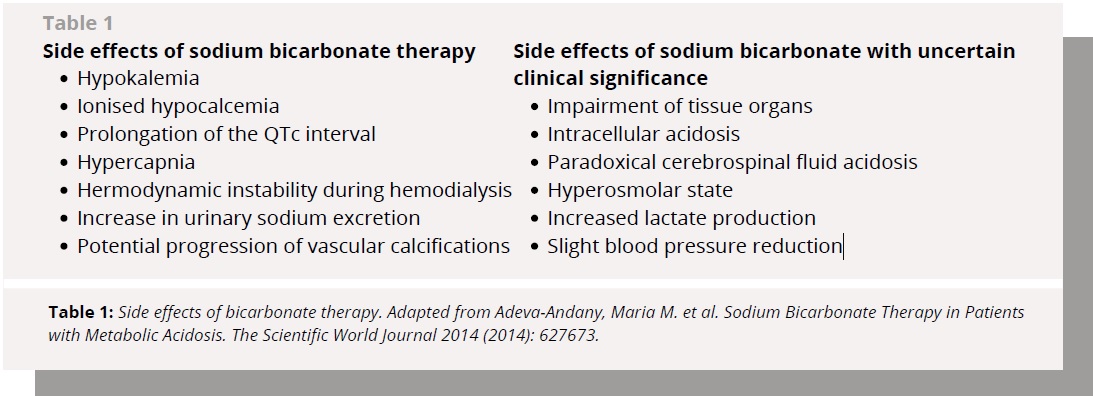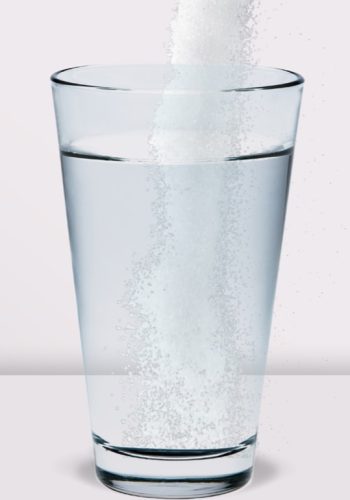Bicarbonate soda supplementation is NOT the ideal way to alkalise your body.
Over the centuries human diets have evolved from being alkaline to acidic, which can lead to detrimental health effects. The body uses endogenous [made in your body] bicarbonate to buffer this acidity, but supply is limited. This has lead to the belief that simply replacing bicarbonate as an alkalising supplement will support the body. However, bicarbonate intake is not ideal and may even be harmful long term.
A brief lesson in biochemistry – don’t worry, I’ll keep it simple, but it helps understand the processed involved in your body.
 The acid-base balance, or pH balance, of the body is tightly maintained at the correct levels by intricate regulatory mechanisms. One of these, and the most important in the blood, is the ability of naturally produced bicarbonate to neutralise acidic hydrogen ions.
The acid-base balance, or pH balance, of the body is tightly maintained at the correct levels by intricate regulatory mechanisms. One of these, and the most important in the blood, is the ability of naturally produced bicarbonate to neutralise acidic hydrogen ions.
Bicarbonate accounts for 52% of the buffering capacity in the body, absorbing the hydrogen ions to produce excretable carbon dioxide and water. Which is why some companies have been marketing bicarbonate as an ideal way to alkalise your body – BUT, their reasoning is flawed.
The body cannot produce an infinite supply of bicarbonate. So, when buffering mechanisms are overwhelmed with acid increasing foods, stress, medications and other acid forming factors, the body is simply unable to compensate, which leads to acidosis and negative health effects.
This often leads to the consideration of increasing bicarbonate stores by ingesting bicarbonates, such as sodium bicarbonate. However, while this may increase the body’s alkalinity in the short term, it is far from the ideal solution.
Bicarbonate supplements are not ideal
The main issues in supplementing with bicarbonates is the effect on stomach acid and its unpleasant side effects. Sodium bicarbonate, for example, leads to an increase in stomach carbon dioxide, which increases the pH of the stomach acid (reduces acidity and increases alkalinity). This is very detrimental to the digestive process. Without adequate hydrochloric acid (HCl), vitamins and minerals from food and supplements are poorly absorbed and assimilated. This is especially problematic in those with already diminished HCl acid levels, such as the older population. It may also cause imbalances in the gut microbiota, leading to bacterial overgrowth, such as SIBO.
The only time that sipping a small glass of bicarbonate in water is to relieve heartburn. If this is a regular occurrence, then a visit to your Naturopath is recommended.
Also, after taking it there is a fast increase in bicarbonate blood concentration, which is rapidly excreted through the kidneys, losing the bicarbonate through the urine. Therefore, the ingested bicarbonate is not available to buffer the excess acidity in the blood.
Side effects with bicarbonate supplementation
Not only does sodium bicarbonate taste very unpleasant, it also comes with significant gastrointestinal side effects, including nausea, stomach pain, diarrhoea, and vomiting. Table 1 shows the more serious side effects with sodium bicarbonate therapy, including intracellular acidosis, increases in sodium levels and reductions in potassium levels.

The best way to truly alkalise
As stated, endogenous bicarbonates are effective at buffering the acidic hydrogen ions; however, taking supplemental bicarbonate is not the best way to increase body alkalinity, in fact it could be detrimental to health.
Citrates are ideal for alkalising the body in food and supplemental form.
Citrates are always absorbed as a salt, with magnesium, potassium, calcium citrate etc, and are found naturally in fruits and vegetables. Supplementing with these citrate salts provides alkalinity with the added benefits of increased minerals. They also have minimal impact on HCL, without any negative impact on digestion and their effect is also longer lasting with a steadier overall alkalisation, compared to bicarbonate supplementation.
Important note: as with all supplements, please resist the urge to self-prescribe or surf the internet for low quality overseas (or local) products. Remember it is always best to consult a qualified Naturopath who will assess your individual needs and support these with quality products.

The above information is courtesy of BioPractica

